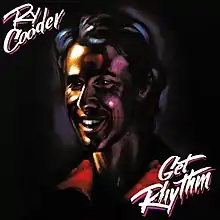Get Rhythm (Ry Cooder album)
Get Rhythm is a studio album by Ry Cooder.[5] It was released in 1987.[6]
| Get Rhythm | ||||
|---|---|---|---|---|
 | ||||
| Studio album by | ||||
| Released | November 1987 | |||
| Studio | Ocean Way Studios, Los Angeles | |||
| Genre | Roots rock[1] | |||
| Length | 40:43 | |||
| Label | Warner Bros. | |||
| Producer | Ry Cooder | |||
| Ry Cooder chronology | ||||
| ||||
| Review scores | |
|---|---|
| Source | Rating |
| AllMusic | |
| New Musical Express | 4/10[3] |
| Robert Christgau | B+[4] |
Track listing
- "Get Rhythm" (Johnny Cash)
- "Low Commotion" (Ry Cooder, Jim Keltner)
- "Going Back to Okinawa" (Ry Cooder)
- "Thirteen Question Method" (Chuck Berry)
- "Women Will Rule the World" (Raymond Quevedo)
- "All Shook Up" (Elvis Presley, Otis Blackwell)
- "I Can Tell by the Way You Smell" (Walter Davis)
- "Across the Borderline" (Ry Cooder, Jim Dickinson, John Hiatt)
- "Let's Have a Ball" (Allen Bunn)
Charts
| Year | Chart | Peak |
|---|---|---|
| 1987 | Australian (Kent Music Report) | 29[7] |
Personnel
- Ry Cooder - guitar, vocals, arrangements
- Van Dyke Parks - keyboards
- Flaco Jiménez - accordion
- Steve Douglas - saxophone
- Jorge Calderón - bass guitar
- Buell Neidlinger - acoustic bass on 2, 6, 8
- Jim Keltner - drums
- Miguel Cruz - percussion
- Bobby King, Terry Evans, Arnold McCuller, Willie Greene, Jr. - backing vocals
- Larry Blackmon - backing vocals on "All Shook Up"
- Harry Dean Stanton - backing vocals on "Across the Borderline"
- Technical
- Ed Cherney - recording
- Steven M. Martin - art direction
- Kalan Brunink - black velvet painting
References
- "Get Rhythm - Ry Cooder". AllMusic.
- "Get Rhythm - Ry Cooder | Songs, Reviews, Credits". AllMusic.
- Barron, Jack (14 November 1987). "Ry Cooder: Get Rhythm". New Musical Express. p. 35.
- "Robert Christgau: CG: Ry Cooder". www.robertchristgau.com.
- "Strung Along". August 12, 2008 – via www.newyorker.com.
- "RY COODER CHARTS HIS OWN COURSE". Los Angeles Times. October 28, 1987.
- Kent, David (1993). Australian Chart Book 1970–1992 (illustrated ed.). St Ives, N.S.W.: Australian Chart Book. p. 73. ISBN 0-646-11917-6.
This article is issued from Wikipedia. The text is licensed under Creative Commons - Attribution - Sharealike. Additional terms may apply for the media files.